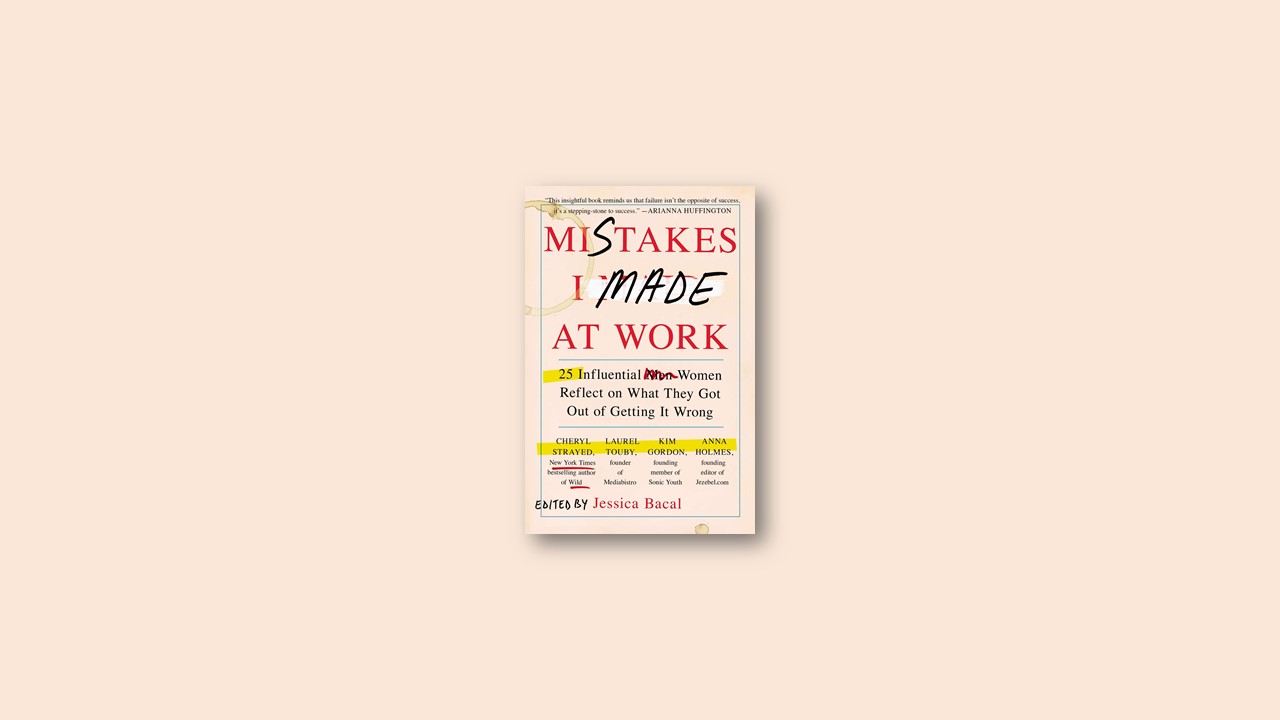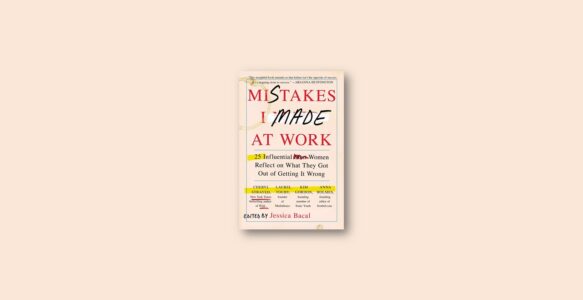Ideal for millennials just starting their careers, for women seeking to advance at work, or for anyone grappling with issues of perfectionism, Mistakes I Made at Work features fascinating and surprising anecdotes, as well as tips for readers.
- Wherever you go, whatever job you take, you always want to be working on skills you can take with you. For example, learning HTML or the newest Windows operating system; taking courses or doing extra reading about your industry—anything to help you build your “toolkit.”
- Know yourself, and don’t try to be someone you’re not. Don’t try to shove down your personality if you have too much personality for the corporate environment
- Don’t be afraid to quit. Who cares what other people think? They’re not the ones living your life. You are. The people we are terrified of disappointing usually want us to be happy. Take the leap and trust that you will land on the other side.
- There is no school, no therapy session, no amount of money that will earn you the wisdom and strength conferred by an epic-fail mistake. It’s like when babies touch something hot and scream in pain. They’ll never touch it again. And neither will you
- Money and a high-status job title aren’t everything when they fail to produce a sense of genuine satisfaction at work.
- Don’t just ask what the world needs. Ask what makes you come alive, and go do it. Because what the world needs is people who have come alive.”
- Being a whole person at work is crucial for feeling affirmed and being productive. For both people of color and LGBT people in the workplace, feelings of isolation are not unusual. Finding professional groups and events that focus on supporting people of color and the LGBT community have been essential forms of self-care.
- When it comes to public speaking, the most important thing to remember is that people don’t come to watch you fail. Care more about the subject than your ego.
- People are comfortable with others who are open about their flaws, who don’t try to pretend to be more than they are. It’s easier to go through life being honest and owning up to your less-than qualities than faking it.
- Know that even if you start out with a certain idea of what you’re going to do in your life, almost no one ends up following their life in a straight line.
- The idea of “work-life balance” is not necessarily helpful. If you are immersed in your work and raising a family, you might feel a lot of good things—but it may not include “balanced.”
- You don’t have to think, “I do this for work and will always do it.” Careers are long, and they evolve and change over time. That’s actually a good thing.
- If you’re any kind of artist, you’re going to have rejection all along the way, but if at least some of what you’re working on sustains you, it will help you to be resilient and to keep going.
- You don’t have to feel the burden of “I must be 110 percent right on my first try, and I may not utter any evidence of hesitancy.” Even the president of the company can turn to a trusted colleague and say, “What do you think? Here’s my idea. Give me some feedback.”
- If you make a mistake, it’s important to distinguish the action from the person. What you did was a mistake, but you aren’t the mistake. Just own up to it and learn how you can do it better. Find someone you can trust to talk about it. And when you see someone else make an error, be that compassionate listener. Help the person acknowledge the error without shaming him or her.
- Young people are often afraid of “living the wrong life.” Every decision becomes momentous because they just haven’t made many of them! They become afraid to decide anything, which can be a mistake in itself. Instead, start with what you really want to create and if the decision takes you a step forward, go for it. If you don’t know what you want to create, focus on gaining a skill.
- Asking for money can be easier over e-mail. If you give someone a chance to get off the hook, they’ll take it—on the phone it’s easy to want to be nice, to say things like, “I know these are hard times and you probably can’t pay this.” (They’ll probably say, “Yes, you’re right.”) You also have a written record of the conversation.
- If you do find yourself asking for money over the phone or in person, allow for silence right after you ask. It’s a very powerful tool.
- You may have reasons for being willing to accept less money because you’re getting something else out of the deal—like experience or prestige. But, especially these days, be very, very careful not to fall into the trap of working for free just for “exposure.” In rare circumstances it can be worth it, but it’s usually just exploitive. You’re worth more than that. And exposure doesn’t pay the bills.
- Every woman can learn how to say no a little bit more in her personal life and also in her professional life, prioritizing herself and her own needs.
- We need to be able to take criticism and use it to improve ourselves. In sports, coaches have that approach; they’ll just say directly, “I need you to do this.”
- Get the broadest education you can. You will never again have a chance to study the way you do when you’re in college and graduate school, so don’t focus too completely on one subject. You may discover a passion you didn’t know you had. And knowing a lot about art, literature, science . . . down the road, it will serve you well.
- Don’t expect too much of yourself when you’re young. It’s better to be a late bloomer than an early one; so many young successes flame out and spend the rest of their lives lamenting what they used to have
- Develop a habit of listening to other people and taking their concerns and questions seriously without overinternalizing their resistance to your ideas.
- When someone is criticizing you, don’t “check out” or dwell on defensive thoughts, like, “She can keep talking, but it’s not affecting me.” Keep your reaction minimal, and ask for more details. Do some soul-searching to figure out “What is this person saying that I really need to own and change?”
- Procrastination is not a great strategy for coping with your perfectionism. Procrastination will prevent you from fully living your life; instead learn to appreciate your mistakes
- It’s important to have a community of colleagues—whether at work, outside of work, or both—that holds you accountable and is honest but also reminds you of your goodness in moments when you’re feeling like a failure.
- Understand that even though change isn’t always easy, each of us has the capacity to develop a “growth mindset” approach to our lives. When you have a “growth mindset,” you understand that mistakes and setbacks are an inevitable part of learning


